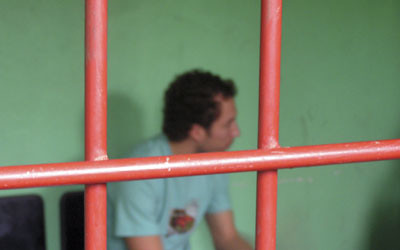“I was a really angry person, but when I got out, I figured that if I carried that anger with me, I wouldn’t be able to live the life I wanted to live,” said Maher, the 127th person exonerated after his conviction for a crime he did not commit. Former army sergeant Maher was wrongfully convicted of two rapes and an attempted rape in Middlesex County in 1984 and spent some 19 years in prison for the crimes DNA proved he did not commit. Maher spoke to the Brandeis community as part of a panel including former Massachusetts prosecutor James Carney; defense attorney Robert N. Feldman of the New England Innocence Project; defense attorney John Swomley and his client, future exoneree Bernard “Bee” Baran.
...James Carney, once the prosecutor who convicted Maher in two separate trials, also spoke. Carney has since become a defense attorney who frequently speaks for the wrongfully convicted. Describing Maher’s case, he said “I was presented with the cases of three women who were sexually assaulted; two grabbed in Lowell, with the same M.O. Each woman looked at a different photo array and all selected Dennis’s [Maher’s] photo from the separate photo array they looked at. Separately, I arranged for three lineups to occur. Each woman saw a different lineup on a different day and each woman identified Dennis. I had corroborative evidence."
Carney added that “his attorney barely asked any questions of the witnesses to defend Dennis. When Dennis was convicted, he received a sentence of ultimately life in prison. After the sentencing, I met with a former colleague and told him about this case and said that I have no specific basis to believe that I have the wrong guy, but if someone can take a look at this case and develop exculpatory evidence, I would take it to a new trial… He had the worst attorney I’ve ever seen."
“Many years later… I heard an effort was being made for Dennis to have his DNA compared to that of the rapist, and that my old office was frustrating that effort. I wrote a letter to the then-district attorney, stating all the things I knew about the cases and that I expected her to do the right thing," he said. "Two days later, they said that they withdrew all the cases. I went to the courthouse and sat I nthe back of the room… and I tried to be part of the wallpaper… when it was over, I asked the chief court officer if I could meet with Dennis briefly, and he was brought to me, and I asked Dennis for his forgiveness and he gave it to me.” The Hoot




No comments:
Post a Comment